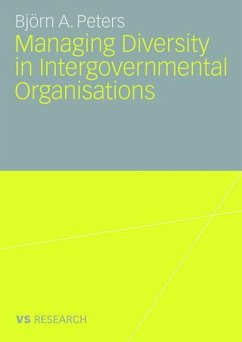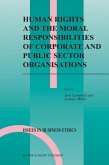This book examines the challenges of managing diversity in intergovernmental organisations (IGOs) in order to cope with their diverse stakeholders. Successful diversity management is pointed out as an essential prerequisite for organisational performance, conflict management, and dynamics of IGOs.
Intergovernmental organisations are important instruments in international and global cooperation. Worldwide environmental changes as well as political, cultural, religious and economic conflicts are heightening the importance tremendously. In order to cope with these issues, it is more imperative than ever for intergovernmental organisations to engage in personnel policy on an international scale and to focus on diversity and managing diversity. Human diversity and managing diversity are complex and exciting aspects of organi- tional life and require a great amount of understanding, empathy, openness and interest in new and different things. The diversity within the case study presented in this book allowed different insights and a differentiated assessment of the various diversity and managing diversity concepts in the context of an intergovernmental organisation. As the empirical exploration of these concepts is still in its beginnings, the methodolo- cal experiences and insights gained during the field study were of special relevance for me. This study is a contribution to improving understanding and management of diversity in intergovernmental organisations. It was above all Prof. Dr. Michael Kirk in whom I found a sympathetic listener and who encouraged me at all times. I especially owe him a debt of gratitude for the critical and constructive comments in all stages of the study that significantly contributed to raising its quality. I would also like to express special thanks to Dr. Michael Stephan for agreeing to second mark the thesis.
Intergovernmental organisations are important instruments in international and global cooperation. Worldwide environmental changes as well as political, cultural, religious and economic conflicts are heightening the importance tremendously. In order to cope with these issues, it is more imperative than ever for intergovernmental organisations to engage in personnel policy on an international scale and to focus on diversity and managing diversity. Human diversity and managing diversity are complex and exciting aspects of organi- tional life and require a great amount of understanding, empathy, openness and interest in new and different things. The diversity within the case study presented in this book allowed different insights and a differentiated assessment of the various diversity and managing diversity concepts in the context of an intergovernmental organisation. As the empirical exploration of these concepts is still in its beginnings, the methodolo- cal experiences and insights gained during the field study were of special relevance for me. This study is a contribution to improving understanding and management of diversity in intergovernmental organisations. It was above all Prof. Dr. Michael Kirk in whom I found a sympathetic listener and who encouraged me at all times. I especially owe him a debt of gratitude for the critical and constructive comments in all stages of the study that significantly contributed to raising its quality. I would also like to express special thanks to Dr. Michael Stephan for agreeing to second mark the thesis.








